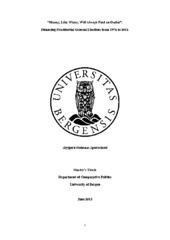| dc.description.abstract | This thesis investigates political finance in the United States focusing on presidential general elections from 1976 to 2012. Political finance is a scholarly field that has received renewed attention in American politics over the last decade, as the regulatory framework for money in elections has changed. Much of the media attention has been given to two Supreme Court decisions in 2010, Citizens United v. FEC and SpeechNow.org v. FEC, which enabled outside groups to receive and spend unlimited funds. With these changes in mind, the common wisdom has been that the costs of elections as a consequence have increased. This thesis asks: Has the cost of U.S. presidential general elections increased over time? In relation to this it examines the processes and mechanisms behind the spending to help identify events and changes that have led to the current state of political finance in U.S. presidential general elections. There are three main findings of this thesis. Firstly, a cost increase in U.S presidential elections is a fact. Real spending has seen a continuous growth from 1976, while spending as part of the economy and real spending per voter have stayed at about the same level up until 2000. For the most recent elections in 2004, 2008 and 2012 however, all three measurements recorded a strong increase, with the 2012 election breaking all previous cost numbers. Secondly, the power balance between the spenders have shifted in favor of the candidates, with outside groups strengthening their position at the expense of the parties - which have played a financially decreasing role in the most recent elections. Thirdly, the parties have become a casualty of an outdated regulatory regime, which has lessened the parties' competitive edge. With the candidates attracting smaller donations, and the Super PAC accepting unlimited donations, the parties, restrained by artificially low contribution limits, have lost out in the battle for political funding. | en_US |
